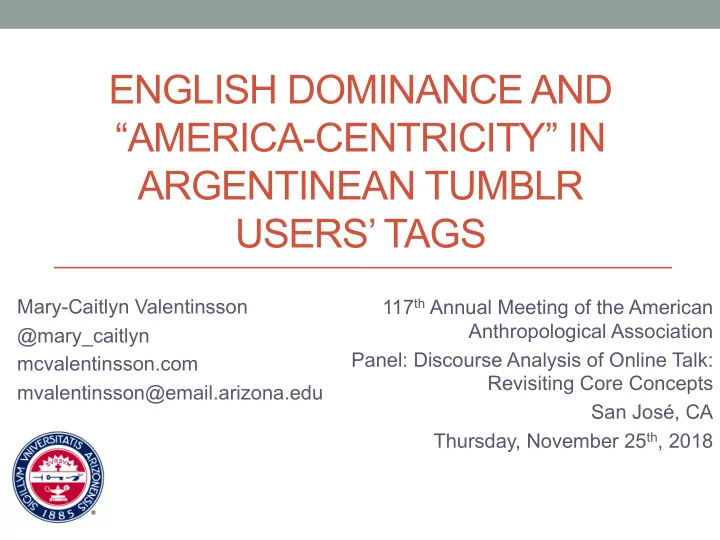

ENGLISH DOMINANCE AND “AMERICA-CENTRICITY” IN ARGENTINEAN TUMBLR USERS’ TAGS Mary-Caitlyn Valentinsson 117 th Annual Meeting of the American Anthropological Association @mary_caitlyn Panel: Discourse Analysis of Online Talk: mcvalentinsson.com Revisiting Core Concepts mvalentinsson@email.arizona.edu San José, CA Thursday, November 25 th , 2018
Theoretical Framework • (Communicative) affordances (Gershon 2017) • The possibilities for (in)action offered or created by the platform. • Bivalent indexicality (Cotter and Valentinsson 2018) • The (activated or unactivated) potentiality for a given linguistic form to concurrently and simultaneously index contrasting or contradictory positionalities, stances, or identities. • Semiotic leveling (Park 2010) • “The simultaneous work of erasure (Irvine and Gal 2000) and highlighting (Bucholtz and Hall 2004).
Organizational tags
Metalinguistic organizational tags
Why do you tag Spanish-language or Argentine/ Latine-content? Steve: Erika:
“Para No Molestar”
“Para No Molestar”
Online Discourse à Offline Context Modern connection Pablo’s use of to opportunity, metalinguistic cosmopolitanism organizational tags Historical connection English in Argentina to elites, wealth Overuse of English Steve and Erika’s linked to qualities use of metalinguistic like “snobbish”, organizational tags “gringo imperialist”
Thank you! Abidin, Crystal. 2018. Internet Celebrity: Understanding Fame Online. Bingley, UK: Graham-Yooll, Andrew. 1981. The Forgotten Colony: A History of the English-Speaking Emerald Group Publishing. Communities in Argentina. London: Hutchinson & Co. Ltd. Androutsopolous, Jannis. 2008. “Potentials and Limitations of Discourse-Centered Online Hurtig, Alyssa. 2017. Social practices and user stances: a study of tagging on Tumblr. MA Ethnography”. Language@Internet 5, article 8. Thesis, Kingston University of London Androutsopolos, Jannis. 2013. “Code-switching in computer-mediated communication.” Hyde, Adam, Mike Linksvaer, kanarinka, Michael Mandiberg, Marta Peirano, Sissu Tarka, Astra Taylor, Alan Toner, Mushon Zer-Aviv. 2012. “What is Collaboration Anyway?” In M. In S. C. Herring, D. Stein, T. Virtanen (Eds.), Pragmatics of computer-mediated Mandiberg (Ed.), The Social Media Reader. New York and London: New York University communication. Berlin and New York: Mouton de Gruyter. 659–686. Press. 53-67. Androutsopoulos, Jannis. 2015. “Networked Multilingualism: Some Language Practices on Irvine, Judith and Susan Gal. 2000. “Language Ideology and Linguistic Differentiation”. In P. Facebook and Their Implications.” International Journal of Bilingualism 19 (2): 185–205. Kroskrity (Ed.), Regimes of Language: Ideologies, Polities, and Identities. Santa Fe, NM: School of American Research Press. 35-83. Bourlai, Elli E. 2018. “‘Comments in Tags, Please!’: Tagging practices on Tumblr”. Discourse, Context & Media 22: 46-56. O’Reilly, Tim. 2012. “What Is Web 2.0? Design Patterns and Business Models for the Next Generation of Software?” In M. Mandiberg (Ed.), The Social Media Reader. New York and Bucholtz, Mary and Kira Hall. 2004. “Theorizing Identity in Language and Sexuality Research”. London: New York University Press. 32-52. Language in Society 33: 469-515. Park, Joseph Sung-Yul. 2010. “Naturalization of Competence and the Neoliberal Subject: Cotter, William and Mary-Caitlyn Valentinsson 2018. “Bivalent class indexing in the Success Stories of English Language Learning in the Korean Conservative Press”. sociolinguistics of specialty coffee talk”. Journal of Sociolinguistics. Journal of Linguistic Anthropology 20(1): 22-38. https://doi.org/10.1111/josl.12305 Rea, Stephen C. 2018. “Calibrating Play: Sociotemporality in South Korean Digital Christiansen, M. Sidury. 2015. “Mexicanness and Social Order in Digital Spaces: Gaming Culture.” American Anthropologist 120 (3): 500–511. Contention Among Members of a Multigenerational Transational Network”. Hispanic Journal of Behavioral Sciences. 37(1): 3-22. Thurlow, Crispin, L. M. Lengel, and A. Tomic. (2004). Computer Mediated Communication: Social Interaction and the Internet. Sage Publications: London. Christiansen, M. Sidury. 2016. “‘¡Hable Bien M’ijo o Gringo o Mx!’:language ideologies in the digital communication practices of transational Mexican bilinguals”. Valentinsson, Mary-Caitlyn. 2018a. “Stance and the construction of authentic celebrity International Journal of Bilingual Education and Bilingualism 21(4):439-450. persona”. Language in Society 47(5): 715-740. Gallo, Klaus. 2001. Great Britain and Argentina: From Invasion to Recognition, 1806-26. Valentinsson, Mary-Caitlyn. 2018b. “What Does ‘Spanglish’ Mean in Argentina?”. Paper Oxford: Palgrave. presented at the Hispanic Linguistics Symposium. University of Texas at Austin. Gershon, Ilana. 2017. “Language and the Newness of Media.” Annual Review of Anthropology 46: 15–31.
Recommend
More recommend